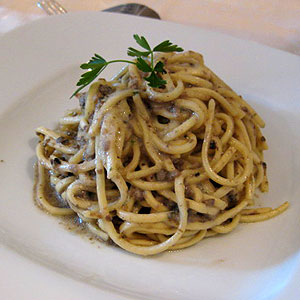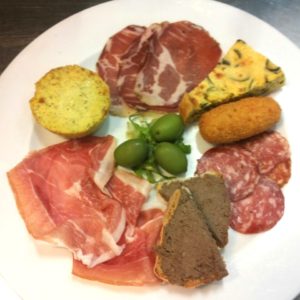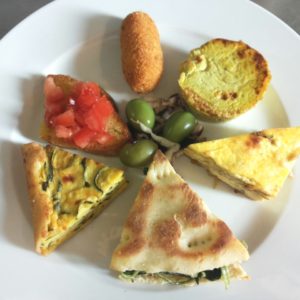Strangozzi alla Pallotta
9,00€
Strangozzi have a format of long pasta, with a square or rectangular section.
The etymology of the name derives from “Strings.” In fact, during the rule of the Papal States, in Umbria anticlericals they lurked in strategic locations to wait for the passage of some priest. On arrival the criminals took off their shoe strings (hence the name of stringozzo, strongozzo, and later, of strangozzo) and they attacked them and strangled them. Then the name would be the result of a merger between the “string” words and “strangling”.
The basis: a dough of wheat flour, water and sometimes salt. The lack of salt in some products such as bread and pasta dates back to the time of the papal domain in Umbria (the Salt War in Perugia, 1540), when the Pope to rake in more taxes for the wars in progress, he decided to put a tax on salt. Umbrian, unwilling appropriate to incur charges which did not consider right, they made the decision to stop using salt.
The ingredients are processed by hand on wooden work surface, a wide board with no knots, bumps or scratches. The eggs were not used because they were bargaining chips.
Women more adept in dough preparation boasted of being able to bring the mixture to proper consistency with the only personal capacity, with the hands and with the movements of the entire body involved in rhythmic movements in the dough processing. The dough, according to an old saying, had to be prepared to “Culu Mossu”, which literally translated means moving all the time the hips. Obtained the puff, pulled with an even wooden rolling pin rasagnolo said, this will have to be cut into strips of 2 mm wide and 20-30 cm in length. The strips, according to another old saying, must be “nerte de pasta and end de cortello”.
To characterize strangozzi are the condiments, always simple, basic, once based strictly vegetable, if you take away the cooking fat, which at times was the bacon. The strangozzo, made with just flour, exalted and enhances the flavor of sauces and food ingredients: oil, wood products, such as wild asparagus, mushrooms, truffles, rich ingredients of the food and thus matched to poor paste only on special occasions of celebration; fresh tomatoes.




Recensioni
Ancora non ci sono recensioni.